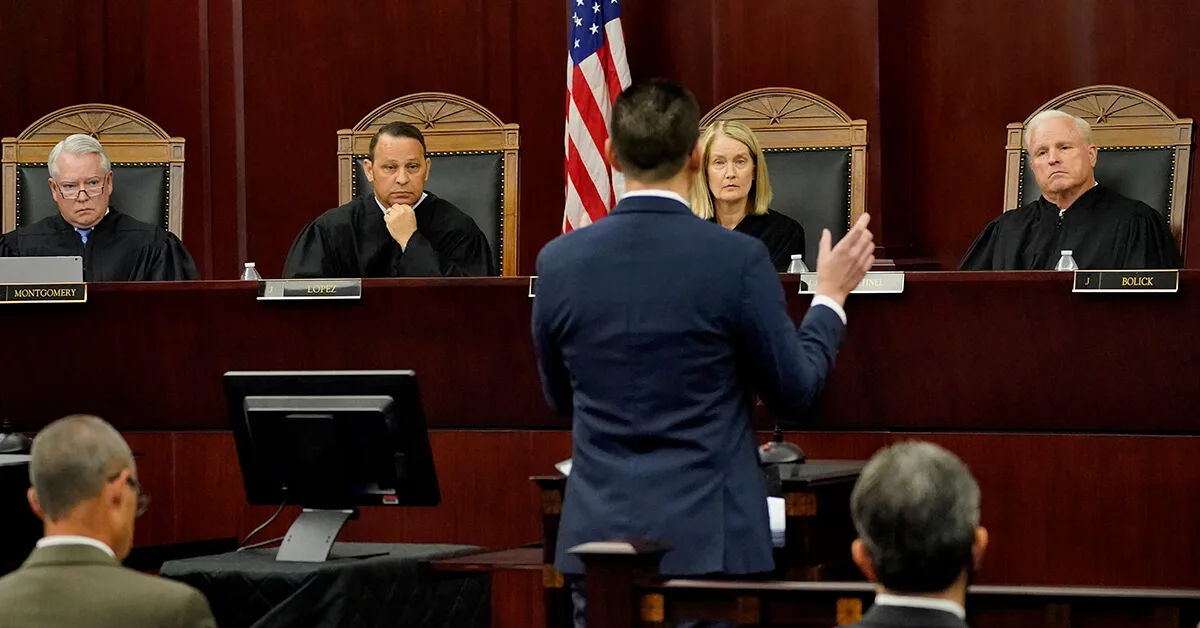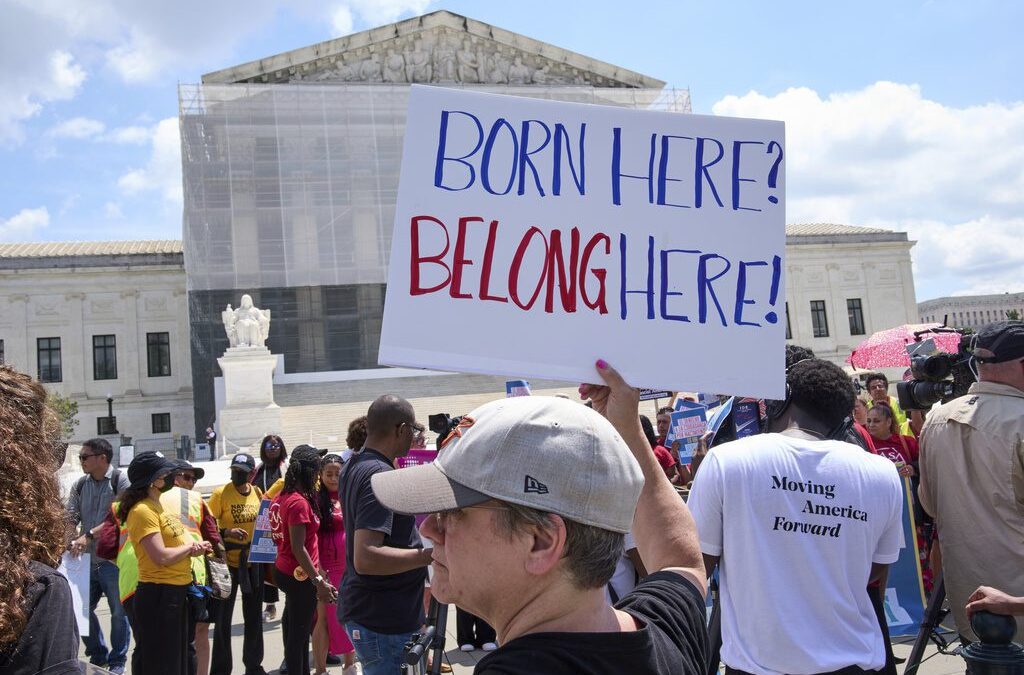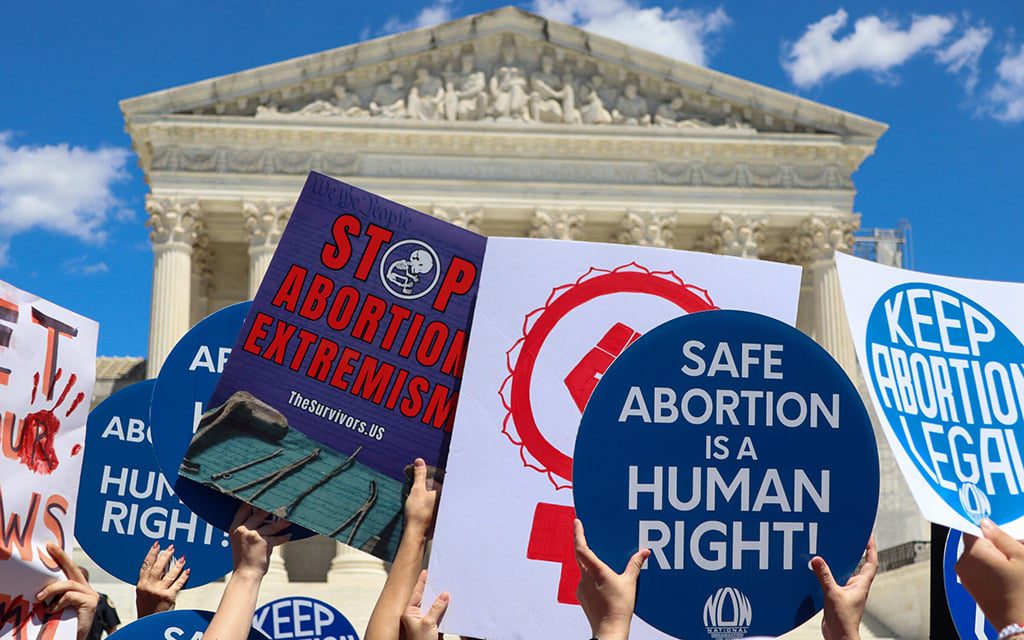
Attorney Andy Gaona gives oral arguments before the Arizona Supreme Court, Tuesday, April 20, 2021, in Phoenix. The Arizona Supreme Court heard an expedited constitutional challenge to a new voter-approved tax on high-earning Arizonans designed to boost school funding on Tuesday. AP Photo/Matt York
Arizona leaders have made it clear that fertility care like in vitro fertilization is not in violation of the state’s strict abortion laws—but in regards to wrongful death statutes, the consensus is less certain.
Arizona Attorney General Kris Mayes sent out a consumer alert on March 6 to clarify that the state’s current, 15-week abortion ban does not apply to embryos used in procedures like IVF. The announcement was a response to a successful lawsuit in Alabama against a fertility clinic for its destruction of fertilized embryos.
“Arizona law, as it currently stands, expressly excludes the ‘conception or the implantation of a fertilized ovum in the uterus’ from the definition of abortion,” the alert states. “In simple terms, that means Arizona’s abortion statutes do not apply to the forming and implantation of an embryo.”
But, while the alert addresses Arizona’s abortion laws in relation to fertility care, it does not touch on the state’s wrongful death of a minor law, which bears similarity to Alabama’s, and is why the lawsuit in that state was filed in the first place.
When asked about whether or not the state’s wrongful death laws included embryos, the Attorney General’s office declined to comment.
What happened in Alabama
The Alabama Supreme Court ruled last month that frozen embryos qualify as persons under the state’s wrongful death of a minor law after three couples sued a fertility clinic for the accidental destruction of stored, fertilized embryos on the company’s premises. The justices interpreted the law to include, “all unborn children without limitation. And that includes unborn children who are not located in utero at the time they are killed.”
The decision was based on a voter-approved amendment to Alabama’s constitution passed in 2018 that declared the state would “recognize and support the sanctity of unborn life and the rights of unborn children, including the right to life.” That, coupled with the state’s wrongful death of a minor law, which allows for prosecution against the negligent death of any person, put fertility care in the crosshairs.
Elisabeth Smith, state policy and advocacy director for the Center for Reproductive Rights, said the amendment’s wording that recognizes an unborn entity as a person to life is what put fertility care in the crosshairs of those who oppose abortion.
“The state Supreme Court essentially looked at the [wrongful death] jurisprudence and then looked at the constitutional amendment, and said—putting these things together— ‘extra uterine children,’ frozen embryos outside of the uterus, are people under the wrongful death statute,” Smith told The Copper Courier. “Could someone in Arizona or an organization or a group of organizations try to create the same result in Arizona? Absolutely.”
Abortion ban spares IVF
A nearly identical case was brought before the Arizona Supreme Court in 2005. In it, the Mayo Clinic was accused of violating the state’s wrongful death law for the negligent destruction of fertilized embryos. The court sided with Mayo, stating in their opinion two primary reasons for rejecting Jeter’s claim: viability and legislative intent.
The justices noted that, at the time, only 65% of frozen embryos survived the thawing process, and of those, only one in five resulted in a live birth.
“Our understanding of scientific knowledge at the current time does not support a broadening of this legal definition to potential viability absent legislative direction,” the opinion reads. “One- to eight-cell cryopreserved pre-embryos stored in straws are not presently viable at that stage of the reproductive process and are incapable of developing into children via an extrauterine process.”
But fertility care has made considerable advancements in the nearly 20 years since Mayo v. Jeter: Over 95% of frozen embryos survive thawing, and a 2019 study by the American Journal of Obstetrics and Gynecology found that nearly 80% of thawed embryos result in live birth. With viability rates well over what the court used in making its decision in 2005, the state’s current supreme court justices could revisit the ruling should a similar case be brought before them.
The legislature has also added clarity to how fertility care should be considered when enforcing abortion and wrongful death laws. A 15-week abortion ban was passed in 2021 that specifically offers an exception for in vitro fertilization or other fertilization healthcare. This ban is currently being reviewed by the Arizona Supreme Court, which has been asked to throw the law out in favor of a statute from 1864 that outlaws abortion in every instance except to save the life of the mother. If the total ban is reinstated, the exception for fertility care will no longer be on the books.
“If a court were to find the 1864 ban as so expansive that it affects fertility care and IVF,” said Smith. “The Arizona legislature would then have the ability to repeal the 1864 ban or pass a new law amending the ban, preserving access to IVF.”
No bills were introduced this session to protect fertility care should the 15-week abortion ban be thrown out, meaning if the ban were to be tossed, a legislative fix might not be possible until 2025.
The Arizona Supreme Court is expected to issue a ruling sometime this summer.
Legislative fix unlikely
Repealing the 1864 abortion ban is not likely to happen while Republicans control the state legislature. A bill was introduced this year by Rep. Stephanie Stahl-Hamilton, D-Tucson, that would repeal it, but it was never given a hearing.
Republicans have also expressed little interest in passing preventative measures to protect any aspect of reproductive healthcare. A set of bills that would have offered preemptive protections for contraceptive care—one introduced by Stahl-Hamilton, the other by Sen. Priya Sundareshan, D-Tucson—was similarly ignored.
“We felt like it was necessary to introduce this protection into state law because federal rights can no longer be taken for granted,” said Sundareshan. “Although the right to contraception is something that the public supports, that’s not necessarily so firmly held within the Republican party—and certainly not from the elected.”
Access to contraceptives does have federal protection as a result of two US Supreme Court cases—Griswold v. Connecticut and Eisenstadt v. Baird—but Justice Clarence Thomas has expressed interest in overturning this precedent, as they did with Roe v Wade. Should that happen, access to contraceptives will be determined by state laws.
States like Missouri have attempted to pass laws restricting contraceptives, and 13 states have already passed legislation protecting contraception access.
In an interview with the Arizona Mirror, Sen. Sonny Borelli, R-Lake Havasu City, was quick to point out that there were no bills introduced at the state level to prohibit the use of contraceptives.
“They’re creating a controversy that doesn’t exist because nobody’s opposing—nobody has any kind of plan to ban any contraceptives,” Borelli said. “Not in this legislature, not this term, not this session.”
Support Our Cause
Thank you for taking the time to read our work. Before you go, we hope you'll consider supporting our values-driven journalism, which has always strived to make clear what's really at stake for Arizonans and our future.
Since day one, our goal here at The Copper Courier has always been to empower people across the state with fact-based news and information. We believe that when people are armed with knowledge about what's happening in their local, state, and federal governments—including who is working on their behalf and who is actively trying to block efforts aimed at improving the daily lives of Arizona families—they will be inspired to become civically engaged.


Planned Parenthood suspends Medicaid services, citing ‘Big Beautiful Bill’ restrictions
Planned Parenthood Arizona (PPAZ) announced on Sept. 29 that as of Oct. 1 it can’t accept patients who rely on the Arizona Health Care Cost...

Trump’s VA abortion ban is a step backwards for Arizona veterans
In August, the US Department of Veterans Affairs (VA) announced that it would no longer allow veterans to access abortion care or counseling through...

Supreme Court limits nationwide injunctions, but fate of Trump birthright citizenship order unclear
WASHINGTON (AP) — A divided Supreme Court on Friday ruled that individual judges lack the authority to grant nationwide injunctions, but the...

In AZ, other states where voters backed abortion rights after Dobbs, legal fights persist
PHOENIX – Voters approved ballot measures protecting abortion rights in seven states last fall. Similar measures failed in three others. But the...





